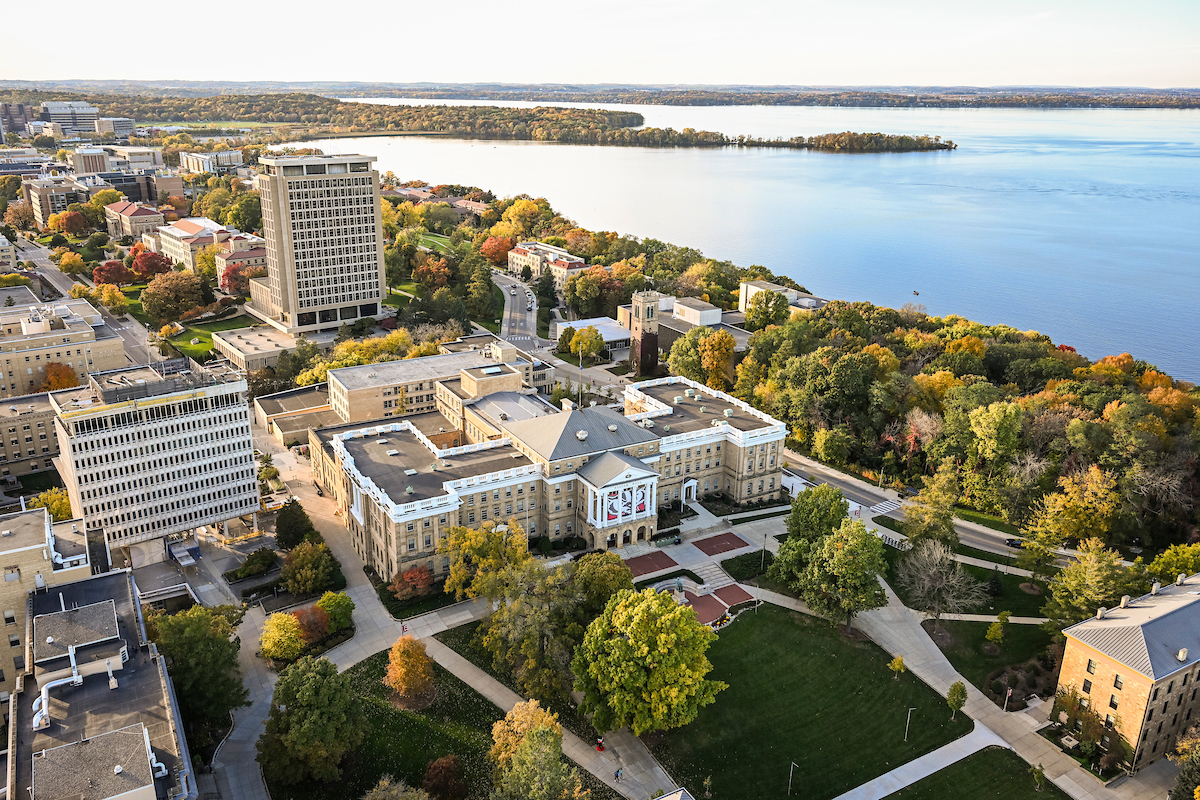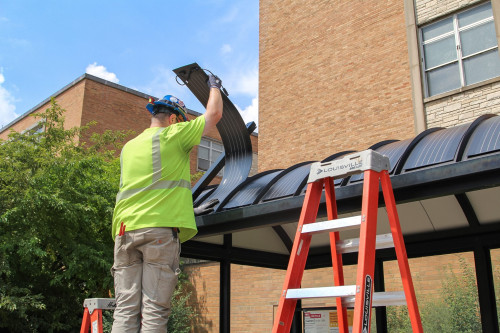UW–Madison launches ambitious environmental sustainability initiative

Chancellor Jennifer L. Mnookin has announced a new sustainability plan that represents the most comprehensive environmental sustainability initiative in UW–Madison’s history and that will advance the university’s research and education missions while also making campus a living laboratory for sustainable practices. Photo: Jeff Miller
The University of Wisconsin–Madison has a rich history of advancing environmental sustainability through its excellence in fields ranging from ecology to wildlife biology to satellite technology. Building on this tradition, the university is launching a new cross-campus initiative focused on environmental sustainability, centered around five goals that include the launch of an interdisciplinary research hub.
Chancellor Jennifer L. Mnookin formally announced the initiative at the meeting of the University of Wisconsin Board of Regents on Thursday, Feb. 8.
The plan represents the most comprehensive environmental sustainability initiative in UW–Madison’s history and will advance the university’s research and education missions while also making campus a living laboratory for sustainable practices.
With the goals as a guide, UW–Madison will be on a course to drastically reduce our campus’s and physical plant’s impact on the environment, cultivate a culture of sustainability, build climate resilience, and inspire innovations that will benefit campus, the people of Wisconsin and the planet.
“This initiative builds on UW–Madison’s great Wisconsin Idea, our tradition of innovation for the public good,” says Mnookin. “It prioritizes issues that affect the people and communities of our state. We owe it to Wisconsin to further demonstrate leadership in sustainability and stewardship of our planet. These goals set us on our way while building on the great strides we’ve taken in recent years.”
The new initiative is structured around the following five goals:
- The launch of the Sustainability Research Hub this spring to facilitate large, interdisciplinary grants and drive sustainability innovation.
- Procuring 100% renewable electricity on campus by 2030 and achieving net-zero emissions by 2048 or sooner to drastically reduce UW–Madison’s carbon footprint, improve public health and address global climate change.
- Meeting prospective and current student demand by ensuring all interested students have access to sustainability educational experiences by 2030.
- Achieving a Zero Waste campus by 2040 by sustainably managing materials and related emissions from procurement and use to reuse or disposal.
- Achieving STARS Gold by 2025 to align UW–Madison performance with peer institutions and foster campus-wide participation in sustainability efforts.
The new initiative reflects the university’s commitment to stewardship and to addressing challenges to the state’s natural resources and a changing climate, both of which are affecting Wisconsin residents.
For instance, there is reduced ice cover on the state’s lakes, disease-carrying ticks are taking advantage of longer growing seasons and warmer temperatures, and climate-related storm shifts and floods are increasing insurance rates and causing costly damage.
By establishing specific targets and timelines for the initiative’s goals, UW–Madison is also integrating key priorities expressed by numerous stakeholders. These goals reflect collaborations with campus shared governance, community members, and students, including the Associated Students of Madison Sustainability Committee and its Student Subcommittee of the Sustainability Advisory Council, who have remained engaged in sustainability issues and interested in educational opportunities.
The university’s 2048 target for reaching net-zero emissions — which coincides with UW–Madison’s 200th anniversary— also aligns with the City of Madison’s 2050 goal and with the Paris Climate Agreement.
“Sustainability has become a core principle in how we plan, build, and operate at UW–Madison,” says Cindy Torstveit, associate vice chancellor of Facilities Planning and Management. “We are incorporating cutting-edge sustainability design features into new building projects, launching a study to understand how we can decarbonize our heating and cooling systems, and collaborating with our utilities on exciting initiatives like the new solar and agriculture research project at the Kegonsa Research Campus.”
Efforts to achieve the initiative’s goals will also include a cross-cutting approach to waste management, focusing on highly visible issues like food scraps and recycling, while tackling less apparent challenges, such as the indirect emissions created by the manufacture of products used on campus.

A contractor places flexible solar panels atop a bus shelter on Engineering Drive. The unique, flexible design of the panels was a student-driven solution. The panels power the shelter’s lights and screens displaying updates on routes. UW Office of Sustainability.
Missy Nergard, director of sustainability at UW–Madison, says that the university’s approach is particularly notable for centering education and research while creating ripple effects that go far beyond the boundaries of campus.
“Our goals are not abstract: They’re fundamentally mission- and people-focused,” Nergard says. “We are developing an institutional strategy that leverages the work of our amazing faculty while creating opportunities for teaching and research here in Madison as well as across the globe.”
She adds: “We are using campus as a living laboratory for sustainability projects while collaborating with communities near and far. And we are honoring and engaging our students, who are passionately interested in bringing sustainability principles to bear on their future careers and in creating a livable, equitable planet.”
Eminent university figures like Aldo Leopold and Gaylord Nelson laid the groundwork for the modern conservation movement and the Earth Day celebration. Today, nearly half of all departments and more than 320 faculty members participate in sustainability-related research, making major contributions to scholarship in air quality and energy, global health and climate change, and environmental justice and food systems, among other topics.
To complement its existing academic opportunities, UW–Madison will expand its educational offerings to help train adaptable, interdisciplinary thinkers who are ready to face the challenges of the future.
“Sustainability has always been at the core of the UW–Madison mission because it’s at the core of people’s lives throughout the state. People are concerned about clean air, trout in their streams and the quality of their water,” says Paul Robbins, dean of the Nelson Institute for Environmental Studies. “This campus sustainability initiative is an extension of our mission to listen to those people and address those concerns. Communities want to see it; our students are demanding it. The next few years are going to be very exciting.”
For more information, visit sustainability.wisc.edu.
Tags: Board of Regents, chancellor, sustainability



